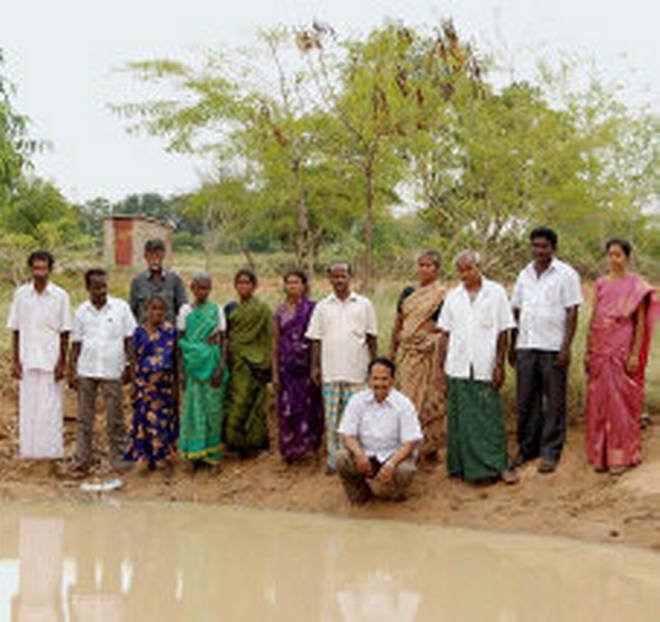Read in : தமிழ்
My dear farming friends, all of us are well aware that many dams in the state are brimming to capacity and some have opened to release excess water, flooding villages. Television screens are full of these images and that of people being moved to safety. Not many can remember when was the last time Tamil Nadu saw floods in the Adi month with no rains.
We are overjoyed that we got Cauvery water. But think for a moment all the thousands of cusecs of water flow running into the sea. In another six months we will be again facing the same problem — water shortage.
For us this is not new. We have been seeing, hearing this for many years.
I want to bring to your attention the fact that if we had been able to store a small amount of this water in farm ponds in our villages it would have helped our agriculture production to a great extent.
You may ask, is all this is not government work? I can tell you, dear friends, that depending on the government for everything may not work.
In my years of travel, there are some places, individuals, organisations which have left me wonderstruck by the scale of work they have done — not for any awards or merits but because they took responsibility for society.
One organisation I happened to visit was in Tiruchi, called Kudumbam. It is an NGO (phone: 0431-2331879 and 2331842.) This organisation has done remarkable work in Kongathiraiyanpatti village (40 km from Pudukottai) on conserving and preserving rain water along with tree planting. This has helped farmers here in rebuilding their lives and they don’t go to cities in search of work.
A rainfed area, here farmers grow paddy and groundnut. Around 35 wells in the village catered to both drinking and irrigation needs. When the monsoon failed, many found it difficult to grow their crops and sustain their families, and migrated in search of work. In desperation, some of them started selling their lands at throwaway prices before leaving.
The local administration did not take notice of this and failed to chalk out a strategy to prevent this migration.
Circa 2008-09, Kudumbam visited the village to get first hand details on the conditions prevailing there.
On interacting with the villagers they realised that the farmers did not know the importance of water conservation nor growing trees.
Many farmers laughed at Kudumbam representatives, chiding them that the village did not have water to grow crops while Kudumbam wanted them to grow trees. But the organization’s representatives persuaded the farmers.
Seven groups were formed. Each group consisted of 14 members, seven men and seven women.
These members were entrusted with the task of bringing the people of the entire village to dig several ponds. In about four-five years, several farm ponds were dug and desilting of canals was done.
Based on the villagers’ suggestions, several fruit and timber trees were planted. The group members took care of the planted seedlings during the initial stages. In about 5-6 years, the village transformed from a dry barren land to a productive zone.
Almost all the farmers in the village agree that the work done by a voluntary organisation, spending its own money, should have been done by the local administration.
Now you see the village filled with trees and water is not a problem there. Not too far back, this region was barren and water-starved.
Now just think: if each of us can attempt a similar exercise in our villages, if not immediately but over the next few years, we also can rid ourselves of water scarcity.
Let us unite on this small idea and try to do something in our villages so that not only us but our entire village can become a proud, self-reliant and self-sustaining model for others.
It is not necessary that there must be a Kudumbam for us. We can unite and meet the agriculture department and give a written request. If no action happens, we can approach the district collectorate with our request. If no action is forthcoming there too, we can send a mail by registered post to the minister concerned. We can try to meet him.
Nothing is impossible in today’s scenario, dear friends…till we meet again, bye for now.
Read in : தமிழ்











